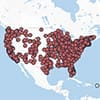September 29, 2021
Texas’s extremist new anti-abortion law (SB 8) is a clear assault on bodily autonomy that denies people, particularly women of color, the ability to make decisions that impact their lives, their bodies, their families, and their health.
SB 8 bans abortion after six weeks into a pregnancy—well before most people even know they are pregnant, making it all but impossible for someone to get an abortion in Texas. (Texas abortion providers have said that 85%-90% of procedures are performed after six weeks.) It also puts a bounty on anyone who has even inadvertently assisted someone in acquiring an abortion.
SB 8 must be stopped. Join activists, organizers, and everyday people on October 2 as we march in every single state to defend freedom, bodily autonomy, and reproductive rights.
How SB 8 Works
SB 8 was designed to block someone who’s pregnant from getting an abortion anywhere in Texas. The increasingly conservative US Supreme Court voted to keep the law in place, effectively ending Roe v. Wade in the state. Given that decision, copycat legislation is sure to follow elsewhere.
Twelve other states have tried banning early-pregnancy abortions, but the laws were all blocked by the courts because… doing that is unconstitutional. SB 8 was written specifically to get around this legal problem. Rather than rely on the state for enforcement of the ban, SB 8 effectively deputizes people, no matter where they live, to become anti-abortion vigilantes. Everyone can sue anybody they suspect of providing abortion care in Texas or helping someone access that care—and they stand to win $10,000 or more if the suits are successful. By “anybody” we mean absolutely anybody: Even an Uber or Lyft driver who drops someone off at an abortion provider could be sued.
The Justice Department recently sued Texas over the law, and it also asked a judge to block its implementation.
But the assault on bodily autonomy goes beyond SB 8. Texas Governor Greg Abbott just signed into law new restrictions that prevent abortion providers from prescribing medication abortion seven weeks into a pregnancy, down from the current limit of 10 weeks. After SB 8 went into effect there was evidence to suggest that demand for medication abortion was rising. Anti-abortion politicians are coming after abortion care in Texas from all sides.
Race and Access to Abortion
Abortion rights are clearly under attack, in Texas and nationwide, but at the same time we have to acknowledge that for many people in this country, especially Black and Latinx women and other women of color, the right to bodily autonomy, reproductive freedom, and abortion services has never truly been realized.
The truth is that SB 8 will not deter wealthy and middle-class Texas residents—people with time and resources—from traveling out of state for an abortion. But SB 8 hits people with low incomes and people of color particularly hard—people who have always faced structural barriers to accessing reproductive healthcare.
While of course being a person of color and having a low income are not automatically synonymous, in this country we know that race and economic opportunity are inextricably linked. Racism is embedded in all of our structures—the criminal legal system, education, housing, healthcare. This means that people of color, and most often women of color, are prevented from accessing basic opportunities and, in many cases, are unable to realize their fundamental rights—like the ability to have autonomy over their own bodies.

Take Action Now!
Criminalizing Women of Color
Since 1976, the Hyde Amendment has blocked federal Medicaid funding for abortion services. (This year, there’s finally some reason to hope that this may be changing.) Medicaid is a federal health insurance program for people with low incomes. Because of systemic racism, Black women and women of color are more likely to have lower-paying jobs and more likely to rely on Medicaid—meaning that, for many of them, access to abortion is a right that has never been realized.
SB 8 makes this long-standing problem even worse. The likely shuttering of providers across Texas will force people seeking abortion care to go to neighboring states, adding extra time, travel, and costs (like child care and lost wages for time off from work). Many people won’t be able to afford it. If SB 8 stands, it will lead to an increase in pregnancy-related deaths.
Let’s just call this law what it is: Racist. Under SB 8, wealthy people (who are more likely to be white) can continue to have control over their own bodies. But it criminalizes people—particularly Black women—who have been robbed of resources and opportunity, damaging their health, restricting their autonomy, and pushing them further into poverty.
What We Can Do About SB 8
We at Ben & Jerry’s are not leaders in this space. But we care about justice and believe that it’s our responsibility to call out injustice when we see it.
We’re listening to, learning from, and following the lead of the experts here, especially the Black women who founded and have been leading the reproductive justice movement for decades.
Abortion has never been fully accessible—and SB 8 has shown us just how fragile the right to bodily autonomy really is. That’s why, on Saturday, October 2, we’ll be taking part in the rallies and marches for reproductive rights being held all across the country. (Find a march near you.) We hope to see you there.



